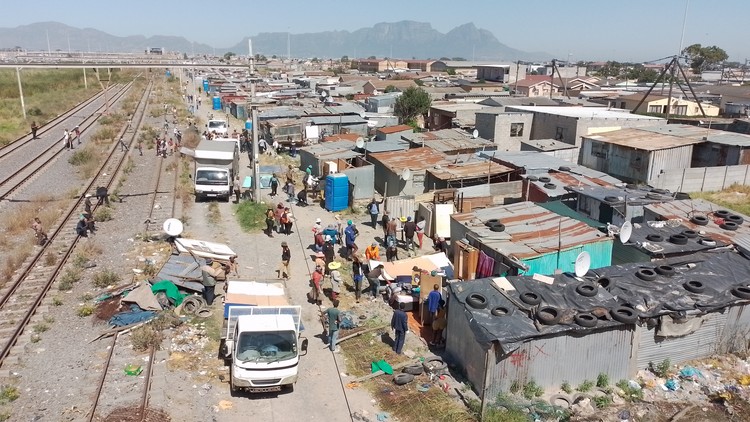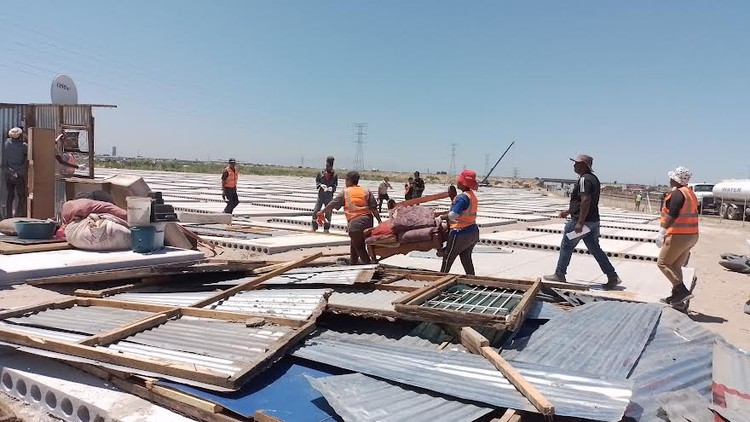Metrorail shack dwellers moved, but to a place without toilets or water
First families moved off Central Line railway tracks
On Thursday the first families were moved from the informal settlement on the railway reserve in Philippi. Photo: Sandiso Phaliso
- The first ten families have been moved from the Central Line railway reserve in Philippi, Cape Town.
- A total of 891 families are to be moved.
- They occupied PRASA land after trains stopped running in 2019.
- The new site, which is temporary, has no water and no toilets.
The process of moving nearly 900 families living on and along the railway tracks of the Central Line in Philippi and Nyanga has started. Shacks at Malema informal settlement near Philippi station were demolished on Thursday and rebuilt about a kilometre away on land belonging to the Passenger Rail Agency of South Africa (PRASA). This move is considered temporary. The families have no toilets and no tap water.
The Central Line to Khayelitsha currently only runs as far as Nyanga because of the occupation of the rail reserve. Transport ministers and PRASA have set several deadlines to resolve the situation but these have been missed for years.
Initially, the shack dwellers were told they would be moved by the end of 2022. Then the date was shifted to mid-2023, and then to the end of this year.
The Philippi families are among thousands who moved onto PRASA land after trains stopped running on the Central Line in 2019. Previously, most had been renting as backyarders and moved onto the railway reserve because they could no longer afford rent.
When GroundUp visited the new site, shacks were being erected very close together on concrete slabs in sand. One street will cross the kilometre-long settlement.
By Thursday afternoon, ten of 891 shacks had been moved. Community leader Zubenathi Apleni said at this rate it would take months to complete the process.
Some residents have been employed to work on the relocation project, demolishing shacks and rebuilding.
But many are not happy with the move, saying they had more space where they were before, and that there are no toilets and no tap water at the new site.
“We were told two days ago that we will be moved, this is very short notice. There are no toilets here, no water. We are happy to move but we are not happy with the living conditions,” said resident Oscar Mpethu.
Olonse Phika, who is also being moved, said he knew it was temporary but the site was unsatisfactory. “There will be the smell of urine, human waste, and we have no idea where we will throw our rubbish,” said Phika.
The shacks are being erected on concrete blocks, very close together. Photo: Sandiso Phaliso
The land is to the east of Stock Road station, beyond Eskom land used by the Somagwaza Institute for the Xhosa ritual of ulwaluko, the passage of boys to manhood. The chairperson of the institute, Sikelela Zokufa, is not happy with the relocation of the families closer to the initiation site.
“It’s a battle between tradition and social development, as ulwaluko forbids the initiates from being near a settlement,” he said.
Also occupying PRASA land illegally are 1,250 households in Langa, according to presentations to Parliament’s Standing Committee on Public Accounts (SCOPA). They are also to be moved. Land has been identified and a rezoning application has been lodged with the City of Cape Town.
GroundUp sent questions to PRASA spokesperson Andiswa Makanda and to the City of Cape Town but comment had not been received at the time of publication. Responses will be added if received.
Support independent journalism
Donate using Payfast

Don't miss out on the latest news
We respect your privacy, and promise we won't spam you.
Next: Picket against “water apartheid”
Previous: One child dead and several people injured in Bloemfontein storm
© 2023 GroundUp. This article is licensed under a Creative Commons Attribution-NoDerivatives 4.0 International License.
You may republish this article, so long as you credit the authors and GroundUp, and do not change the text. Please include a link back to the original article.
We put an invisible pixel in the article so that we can count traffic to republishers. All analytics tools are solely on our servers. We do not give our logs to any third party. Logs are deleted after two weeks. We do not use any IP address identifying information except to count regional traffic. We are solely interested in counting hits, not tracking users. If you republish, please do not delete the invisible pixel.


